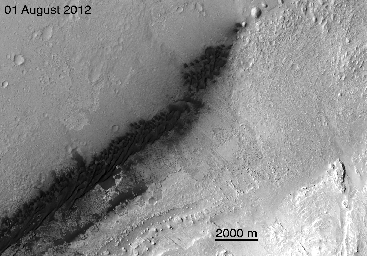
|
Before and After Curiosity’s Touchdown
- Click the image above for a larger view
 Movie Download Options
Movie Download Options- Full-Res JPEG (1709 x 1193) (305.4 kB)
- Full-Res TIFF (1709 x 1193) (2.0 MB)
Caption:
These images from NASA's Mars Reconnaissance Orbiter (MRO) show a before-and-after comparison of the area where NASA's Curiosity rover landed on Aug. 5 PDT (Aug. 6 EDT). The images were taken by the Context Camera on MRO on Aug. 1 and Aug. 7.
They show the landing effects of the descent stage, the rover lander, the back shell and parachute, and the heat shield, all found on the left side of the image (west of the dune field). On the right side of the image, in a line with the rover and heat shield, are small dark features that very much resemble impact sites seen by the Context Camera elsewhere on Mars. These are interpreted to be the impact sites of the tungsten Entry Ballast Masses released by the entry vehicle just before parachute deployment.
The Context Camera took the pictures at a resolution of 20 feet (6 meters) per pixel. The images here are projected at 16 feet (5 meters) per pixel.
The Aug. 7 image was taken at the same time as a post-landing image taken by the orbiter's High Resolution Imaging Science Experiment camera (see PIA16001 ). The Context Camera image is 20 times lower in resolution but covers an area almost 20 times larger. The wider field of view and longer image permits the Context Camera to perform reconnaissance for higher resolution targets. A Context Camera image is typically about 19 by 171 miles (30 by 275 kilometers) but because the camera was looking at an angle, it covered a swath about 26 by 171 miles (42 by 275 kilometers).
Cataloging Keywords:
| Name | Value | Additional Values |
|---|---|---|
| Target | Mars | |
| System | ||
| Target Type | Planet | |
| Mission | Mars Reconnaissance Orbiter (MRO) | Mars Science Laboratory (MSL) |
| Instrument Host | Mars Reconnaissance Orbiter | Curiosity Rover |
| Host Type | Orbiter | Rover |
| Instrument | Context Camera (CTX) | |
| Detector | ||
| Extra Keywords | Dune, Grayscale, Impact, Movie | |
| Acquisition Date | ||
| Release Date | 2012-08-08 | |
| Date in Caption | ||
| Image Credit | NASA/JPL-Caltech/MSSS | |
| Source | photojournal.jpl.nasa.gov/catalog/PIA16014 | |
| Identifier | PIA16014 | |
